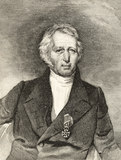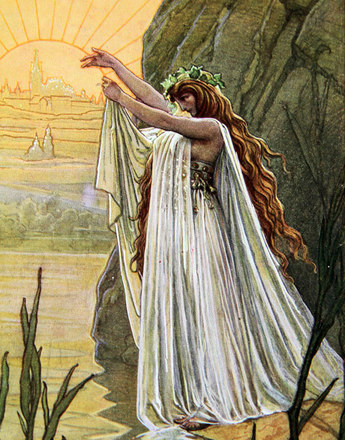-

Karl v. Siegel: Josef Dobrovský (1753–1829), portrait engraving based on the oil painting in the Bohemian National Museum
Copyright: Schloß Schönbrunn Kultur-und Betriebsges.m.b.H./Fotograf: Alexander E. Koller
Partner: Schloß Schönbrunn Kultur- und Betriebsges.m.b.H. -

F. Taddeo Mayer: Josef Jungmann (1773–1847), Portrait engraving
Copyright: Schloß Schönbrunn Kultur-und Betriebsges.m.b.H./Fotograf: Alexander E. Koller
Partner: Schloß Schönbrunn Kultur- und Betriebsges.m.b.H. -

František Palacký (1798–1876), portrait based on a lithograph by Dauthage
Copyright: Schloß Schönbrunn Kultur-und Betriebsges.m.b.H./Fotograf: Alexander E. Koller
Partner: Schloß Schönbrunn Kultur- und Betriebsges.m.b.H.
The Czech national evolution was shaped by the cultural pioneer achievements of the so-called “arousers” (Czech: buditelé). In the early nineteenth century a number of academics and scholars prepared the foundations of the modern Czech national consciousness from which the “rebirth” (národní obrození) of the Czech linguistic nation sprang.
Of outstanding significance here is the linguist Josef Dobrovský (1753–1829), who founded Slav studies as a discipline. His works – History of the Bohemian Language (1792), Detailed Theoretical System of the Bohemian Language (1800) and the German-Bohemian Dictionary (1800) – formed the foundation of modern Czech linguistics and the evolution of linguistic identification.
The next generation of “arousers” was led by Josef Jungmann (1773–1847), who radically reformed the Czech literary language. His ground-breaking major work was Slovesnost (Literature), a reader and textbook for orthography and style published in 1820. Jungmann was a linguistic purist and endeavoured to replace the numerous Germanisms and neologisms integrated into Czech in the Baroque era with earlier Czech words or by adopting words from other Slavic languages or borrowed translations. His model was the rich Czech literature of humanism, which Jungmann deemed to be the “Golden Age” of Czech linguistic culture.
Jungmann’s five-volume Czech-German dictionary (published in 1835-1839) was a milestone in the language race run between the representatives of German and Czech intelligentsia in Bohemia. With it he wished to demonstrate the equivalence of the two languages.
Another essential element for the evolving Czech national identity besides the revival of the language was the preoccupation with history. The foremost personality in this sphere was František Palacký (1798–1876), state historiographer at the Royal Bohemian State Museum in Prague. This patrimonial research institution was based on an initiative of patrons from the Bohemian aristocracy and was originally founded in 1818 for the purpose of fostering the national awareness of both linguistic groups in Bohemia. Under Palacký’s aegis a change took place in an emphatically Czech institution.
Palacký was the brains behind the historically-based ideological foundation upon which the Czech nation evolved. His main work was his History of Bohemia published in German in 1836. The Czech version came out in 1848 under an already less ambiguous title, namely Dějiny národu českého v Čechách a na Moravě (History of the Czech People in Bohemia and Moravia). Here, Palacký outlined an emphatically Czech view of the country’s history. According to this, the Czech people, who in their nature were freedom-loving and democratically-minded, had been suppressed by the German feudal system. Palacký interpreted history as a fight between the “Slav” and the “German” heritage. The historical canon devised by Palacký divided the history of the Czechs into positive and negative epochs. Connoted positively were the eras of the Hussite Revolution and the heyday of the aristocratic system of estates in the fifteenth and sixteenth centuries. Pejoratively charged were the German interior colonisation in the Late Middle Ages, the suppression of the uprising of the Bohemian estates in 1620 and the ensuing Catholic Counter-Reformation, also the downfall of the Bohemian body politic in the federation of the Habsburg Monarchy. These assessments have never ceased to influence the general historical mindset of the Czechs, even today.
The contest between German and Czech national revivalists was also capable of taking on grotesque forms. Here we might mention the so-called manuscript controversy as an example. Burning with excessive patriotic ardour, the scholar Václav Hanka (1791–1861) wrote a number of heroic epics which – with the motto “the end justifies the means” – he published as originals of the High Middle Ages in order to “prove” that the tradition of Czech literature reached back into the dim and distant past. Although these works were soon dismissed as fakes, the controversy accompanied Czech national evolution throughout the entire nineteenth century.
Translation: Abigail Prohaska
Hoensch, Jörg K.: Geschichte Böhmens. Von der slavischen Landnahme bis ins 20. Jahrhundert, München 1987
Kořalka, Jiří: Tschechen im Habsburgerreich und in Europa 1815 bis 1914. Sozialgeschichtliche Zusammenhänge der neuzeitlichen Nationsbildung und der Nationalitätenfrage in den böhmischen Ländern (Schriftenreihe des Österreichischen Ost- und Südosteuropa-Instituts 18), Wien 1991
Křen, Jan: Dvě století střední Evropy [Zwei Jahrhunderte Mitteleuropas], Praha 2005
Moritsch, Andreas (Hrsg.): Der Austroslavismus. Ein verfrühtes Konzept zur politischen Neugestaltung Mitteleuropas [Schriftenreihe des Internationalen Zentrums für Europäische Nationalismus- und Minderheitenforschung 1], Wien 1996
Plaschka, Richard G.: Von Palacký bis Pekař. Geschichtswissenschaft und Nationalbewußtsein bei den Tschechen (Wiener Archiv für Geschichte des Slawentums und Osteuropas 1), Graz 1955
Rumpler, Helmut: Eine Chance für Mitteleuropa. Bürgerliche Emanzipation und Staatsverfall in der Habsburgermonarchie [Österreichische Geschichte 1804–1914, hrsg. von Herwig Wolfram], Wien 2005
-
Chapters
- The Czechs in the Habsburg Monarchy
- How Czechs evolved from Bohemians
- The Revivalists of the Nation
- Separate Ways: The Effects of the 1848 Revolution in Bohemia
- The Vectors of Czech National Identity
- The Call for Autonomy
- Hardening of the Fronts: The Czech Demand for the Bohemian Compromise
- Attempts at Solutions and Escalation: Language Conflict and Badeni Crisis
- The Czechs’ Spectrum of Parties
- The Lack of Alternatives: the Attitude of the Czechs towards the Habsburg Monarchy at the Outbreak of the War



